Top ratings go to 1) Raw Honey, 2) PureLo by Swanson, 3) Swerve Sweetener, 4) Lakanto, and 5) Raw Stevia leaves, the only healthy sweeteners I can find. My criterion are purity, stable blood sugar, and balanced metabolism. With a world epidemic of diabetes, obesity, and metabolic disorder, we need sweeteners that stop the sugar cycle in it’s tracks. Sadly, grocery stores do not carry healthy sweeteners, so we buy them online. We don’t really need sweeteners, but some of us got used to a sugar fix. Keep an open mind to skip the whole concept of sweets!
1. Raw honey is the best Paleo sweetener. But very high glycemic! Use RARELY!
Honey is the food eaten by the young bees, and it’s a superfood for humans too. Our Paleolithic ancestors took the risk to gather it from beehives seasonally. But – not every day! Honey is very high in carbs, calories, and sugar! Oooooh, it gives a nice big blood sugar spike! Most people do not tolerate the high glycemic levels in honey. Honey is about 50% fructose, 44% glucose, and 1% sucrose, which is pretty close to table sugar (see chart at bottom of page). For these reasons I reserve honey as a rare Paleo treat, and use it very infrequently. Honey is almost twice as sweet as sugar, so one would use 1/2 to 2/3 of the amount of sugar called for in a conventional recipe.
Conventional honey is often mixed with other glucose or fructose sweeteners. Look for PURE RAW ORGANIC HONEY.
2. PURELO – Lo Han Guo, everyday sweetener.
PureLo Lo Han Sweetener by Swanson is made from luo han guo, a sweet Chinese herb. It was raised by monks for centuries, so it is often called “monk fruit”. I trust PureLo by Swanson Vitamins, which is mixed with inulin powder and is approximately six times sweeter than sugar. It has a gratifying sweet flavor and no aftertaste. Even better, it has zero carbs, zero calories, and contains no sugars. After much research, I have not found a PURE source for 100% lo han guo.
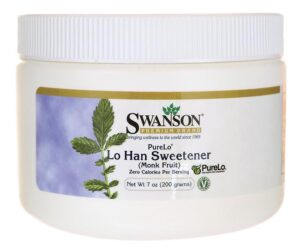 Find PureLo online at swansonvitamins.com. Use 1/6 the amount of sugar called for in a conventional recipe.
Find PureLo online at swansonvitamins.com. Use 1/6 the amount of sugar called for in a conventional recipe.
3. Swerve Sweetener is a blend of erythritol, a naturally occurring fermented sweetener. Swerve is my favorite brand of erythritol because, unlike other brands, it is made from non-GMO vegetables and fruits. It has zero calories and does not affect blood sugar. Swerve sweetener works well in most baked goods. I find it does not always dissolve completely when chilled. It is used cup for cup like sugar. Swerve is available in many varieties!
Lakanto is a non-glycemic sweetener made from Erythritol and Monkfruit that you can buy online. Check it out here:
5. Raw Unprocessed Stevia Leaves or Powder
One of the safest and least processed sweeteners available, pure stevia leaves, or pure green stevia powder are 35-40 times sweeter than sugar. For a delicious way to sweeten your tea, get a stevia plant, available as seeds or starters from stevianow.com. Unprocessed stevia has a lingering aftertaste some people don’t like. Taste buds are very personal, however the flavor of stevia doesn’t bother me at all. Buy organic raw stevia powder as Frontier brand from iherb.com. A 1-pound bag will last you a lifetime! Raw stevia is very different from chemically processed stevioside drops and powders we find in the grocery store. Unfortunately these are also called “stevia”, however they are highly processed with chemicals such as formaldehyde, methyl alcohol, and 250-300 times sweeter than sugar. A proprietary refinement process was developed because the stevia leaf cell walls are so tough, they don’t break with the usual methods of heating or centrifuging. These chemicals are not healthy. Stick with unprocessed stevia leaves, and stay away from processed stevia drops or powders, which are more akin to artificial sweeteners.
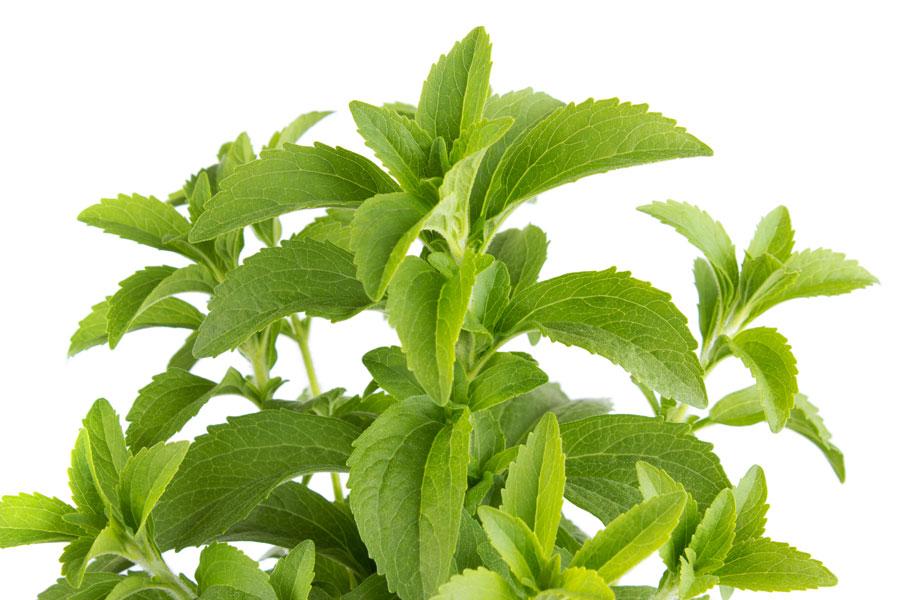 Pure stevia leaves are a wonderful Paleo sweetener. Avoid processed stevia drops or powders.
Pure stevia leaves are a wonderful Paleo sweetener. Avoid processed stevia drops or powders.
What’s your favorite Paleo sweetener?
Experiment to find the sweetener that works for you. There’s no sweetener that’s right for everyone. Sugars are definitely not Paleo. And as a general rule, sugar is a metabolic scrambler in the body – sooner or later there’s a price to pay in your health. Since I can’t eat sugars of any kind, my body is a kind of litmus test for sweets. However it is possible to substitute any sweetener in my recipes, knowing that it may change the nutrition and carb profile.
Sweeteners I do not recommend:
I don’t recommend maple syrup, coconut sugar, or agave nectar, as they aren’t truly Paleo. They’re processed, and boiled down to concentrate them so they’re super-sweet. This makes them very high in fructose sugar, which carries the same health risks as high fructose corn syrup. If you follow the Paleo conventional wisdom that uses these sweeteners, you could be 100% Paleo and still be addicted to sweets – obese and diabetic. No way! I do not use xylitol because it has 66% the calories of table sugar, it raises blood sugar, causes gastric distress, and is toxic to dogs. I do not use refined stevia powders or liquids, as they’re highly processed with chemicals.
Take a look at the chart below for a comparison of carbs in sweeteners. For more details, see my researched articles: What are the Best Paleo Sweeteners?, and 325 Sweeteners, Which is Best?
(This article is a brief executive summary.
For more details see my researched articles: What are the Best Paleo Sweeteners? and 325 Sweeteners, Which is Best?)


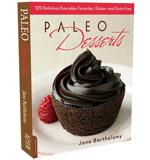

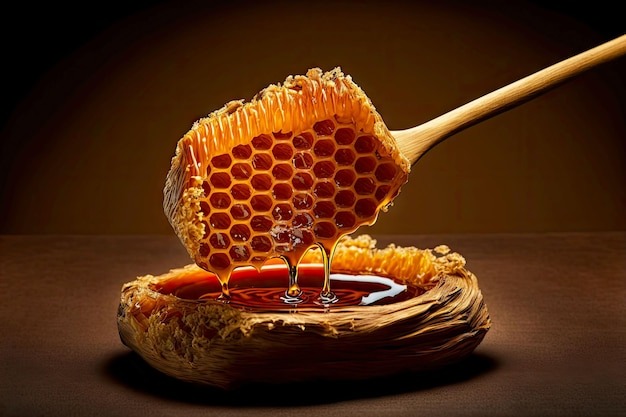
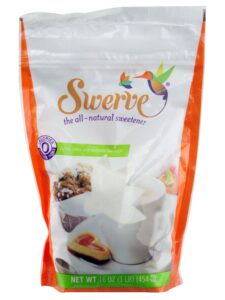
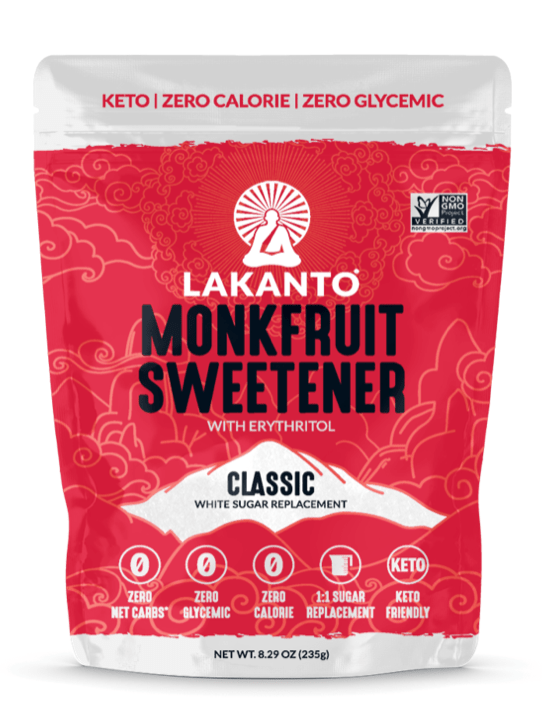
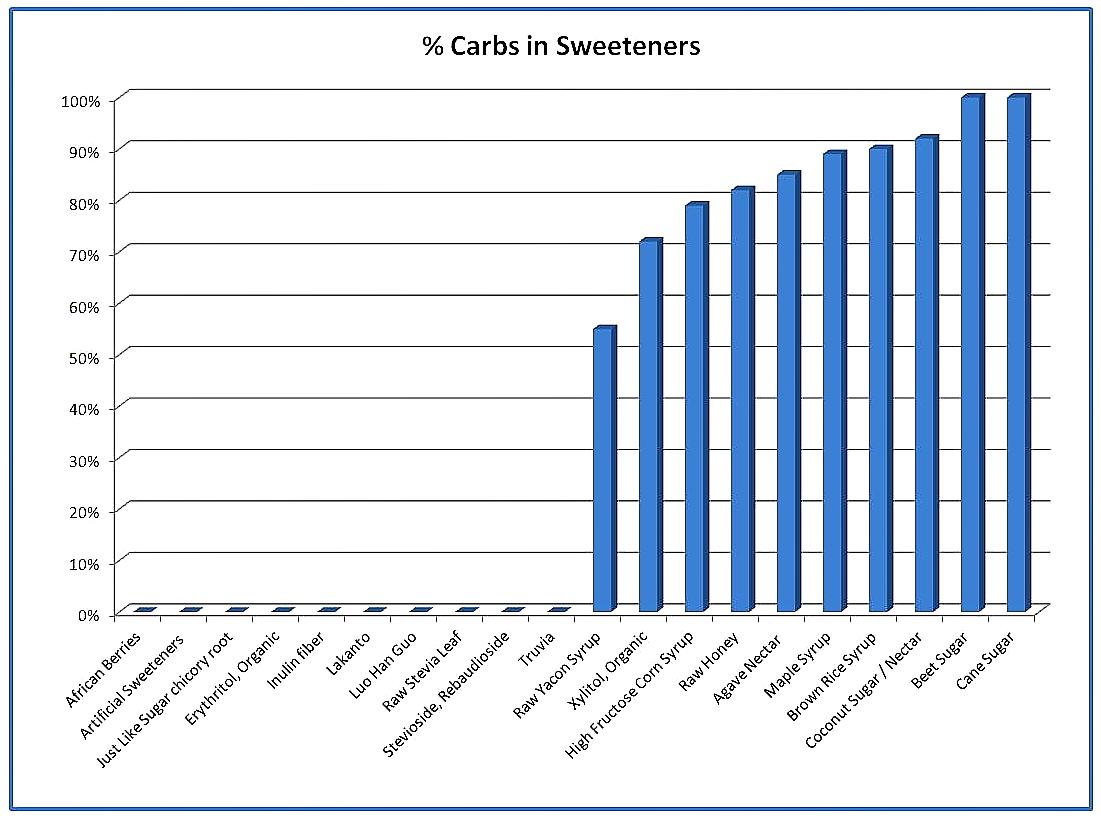
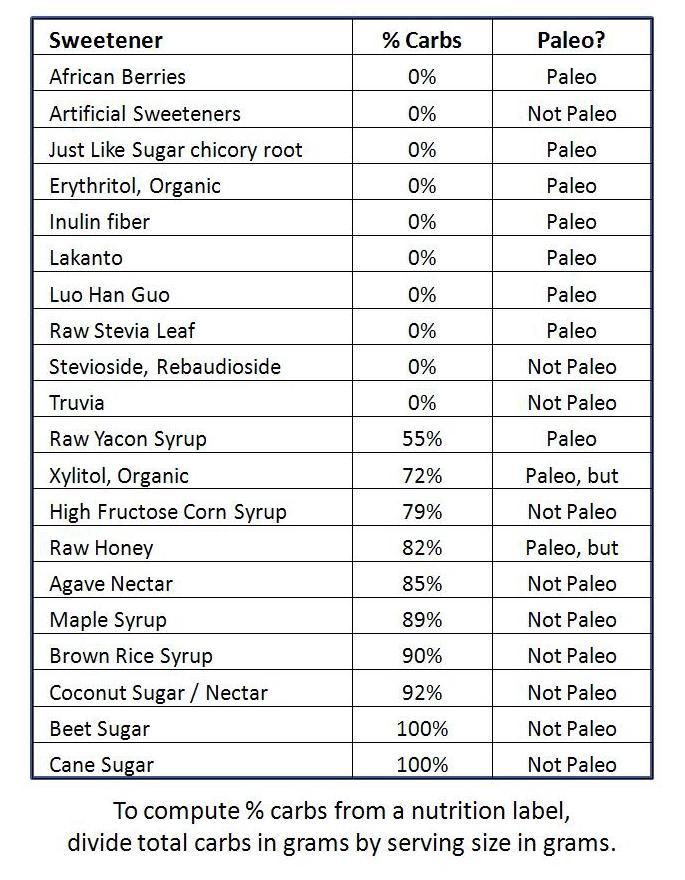
24 Replies to "My Top 5 Sweetener Choices"
Beryl January 11, 2025 (8:56 am)
Erythritol has recently been linked to stroke and heart attack. The other sugar alcohols are also being investigated for similar drawbacks. So, I threw out all my Lakanto products, and am moving to100% monkfruit sweetener.
Jane Barthelemy February 2, 2025 (6:57 am)
Hello Beryl, Thank you for your comment. Yes, 100% Monkfruit as a sweetener is a good choice – if you can find the pure stuff. Through the years I have heard so many negative claims about “alternative” products that go against the food industry’s dictate. (Danger! Danger!) Once I heard 100% organic leaf spinach was being investigated for making people sick. Ha Ha! I also make decisions by personal experience, since I trust my own body. I have never had a personal negative reaction to Erythritol, however I have heard claims that it causes digestive upset in a few people. I have ALSO heard claims that Xylitol is safe for everyone as a low-sugar sweeter. Both claims are false, as I’ve used it, noticed the glycemic rush and suffered Diarrhea all night. So, for these reasons I often take a slightly delayed reaction when I hear of suspected health investigations where world market competition and billions of dollars are on the line. Ha Ha! Wait and see. In the meantime, Monkfruit is great. And of course we don’t really need sweeteners. Real food does everything. Best wishes for your delicious health! Jane
Dwight June 15, 2024 (1:05 pm)
It’s Just Inulin Prebiotic Fiber on Amazon appears to be like your discontinued sweetener.
https://a.co/d/8rHmESu
What do you think?
Jane Barthelemy June 24, 2024 (5:54 am)
Hello Dwight, WOW! That is a real find! Did you try this product? My understanding is that chicory inulin is about 30% as sweet as table sugar. So it seems it would not be effective as a sugar substitute. I will look into this, and really appreciate the info! thanks again for the link! Jane
kim martin May 11, 2024 (3:43 pm)
Allulose seems to be the new sugar substitute in town….any thoughts?
Jane Barthelemy May 16, 2024 (4:14 am)
Hi Kim,
This is a great question. I haven’t tried Allulose. Polyols are not prebiotic like chicory root inulin. So eating a lot of allulose might cause some intestinal surprises. I’d have to taste it myself to be sure. I’d say go ahead with allulose. A great idea! Thanks again, Jane
I understand allulose is a polyol, also known as sugar alcohol that is neither sugars nor alcohol in the traditional sense. Polyols can also be produced via industrial processes. Allulose, a monosaccharide isomer of fructose, has been on a meteoric rise the past three years. Allulose is sometimes used along with high natural potency sweeteners. It got a boost in 2019 when the FDA declared allulose could be excluded from the total sugar on nutrition panels because it contains virtually no calories.
Mixing allulose, stevia, erythritol, monk fruit and other natural sweeteners in specific combinations is an effective way to overcome any functional and flavor issues. SilkySweet is one of those combinations. New on the market, it’s based on non-bioengineered allulose plus monk fruit and a proprietary sweetener “that matches the profile of stevia,” says Chuck Nix of Silky Smooth MicroCreamery. It actually has nine ingredients, including bitterness maskers, flavor modulators, flavor enhancers “and a pinch of sea salt,” enabling Nix to call it “the world’s first flavor-enhancing sweetener. Here’s a link to more info: https://www.foodprocessing.com/ingredients/sweetening-solutions/article/33000362/stevia-monk-fruit-and-allulose-provide-other-ways-to-be-sweet.
And another great link.
Will February 23, 2024 (6:24 am)
Regarding monk fruit, have you considered the organic monk fruit liquid made by NOW Foods? https://www.nowfoods.com/products/natural-foods/monk-fruit-liquid-organic
Jane Barthelemy February 25, 2024 (4:35 pm)
Hi Will, Thanks for your comment. I would hope that NOW foods would do a 100% pure monk fruit sweetener. But I’ve never tested this one. Does it contain any other ingredients besides monk fruit? Best wishes for your delicious health! Jane
Eli Dumitru February 20, 2024 (1:46 am)
Hi Jane,
Can you please respond to my previous question if 100% pure extract monk fruit powder is the same as luo han guo.
Thank you
Jane Barthelemy February 20, 2024 (3:43 am)
Hello Eli, So sorry for the delay. https://nuts.com/luo Han guo. Yes, this appears to be pure Luo Han Guo. Wonderful! I was totally unable to find it through direct Chinese medical importers. I discovered their so-called “pure” Luo Han guo was mixed with maltodextrin. I got a sugar rush from it, so I had to ask, and the additional ingredient was confirmed verbally. Maybe nuts.com has a more reliable source, and if so, that is wonderful! Try it for yourself and see if you get a sugar high. Or you can also have it lab tested for GMO maltodextrin. This is a good find. Hope it is really pure! Thanks for your sharp eyes! Jane
Deborah May 6, 2023 (1:17 pm)
I’ve read recently that Erythritol has been linked to heart attack and stroke.
Every time I think I find a possible substitute to sugar (Stevia, Erythritol), I later find out it’s could be just as bad or worse. It’s so frustrating.
Jane Barthelemy May 12, 2023 (6:07 pm)
Hi Deborah, thank you for your comment. Yes, it’s quite hard to know what to believe these days. Everyone has an angle and a motive. I don’t have any answers. Best wishes always for your delicious health! Jane
Elizabeth November 25, 2022 (3:40 pm)
Hi there!
Please tell me your thoughts on Yacon syrup. You listed it as Paleo but high carb. Is the sweetness level equal to sugar teaspoon per teaspoon or a multiple times sweeter substance. Example: It’s high in carbs but if I only need an 8th of a teaspoon in a cup of chai, isn’t that pretty good? (I bought a jar on super clearance – not expired – and have yet to crack it open.)
Any updates on your knowledge of Allulose?
Since erythritol is a “sugar alcohol” (right?) is it harder on your liver?
Jane Barthelemy November 25, 2022 (4:15 pm)
Hello Elizabeth, thank you for your comment. Back in 2012 when I wrote my first cookbook Paleo Desserts, it was possible to buy RAW Yacon syrup. And its sweetness level varied. As time passed, Yacon producers began to boil it down to make it sweeter, much like maple sap is reduced into the syrup we know as maple syrup. And the term “RAW” is simply a marketing term with no real meaning. So, now Yacon syrup we buy in the stores is mostly very sweet. And it will cause all the illnesses just the same as sugar. This is the short, sweet version of the story as I see it. The sweeteners I recommend that do not affect blood sugar are just a few. In most cases a little Yacon syrup will not hurt anyone. https://janeshealthykitchen.com/5-top-paleo-sweeteners/
Best wishes for you delicious health!
Jane
Terilyn August 31, 2022 (6:47 pm)
Do you have any information on Allulose?
Jane Barthelemy August 31, 2022 (9:05 pm)
Hello Terilyn, Thanks for your question. I have not researched Allulose yet. What is it made of? How does it affect the body? Sorry, today I have no answer on Allulose. Best wishes for your delicious health. Jane
Mary May 29, 2022 (7:24 pm)
Jane, was we were wondering, in your book Paleo Desserts, how do we use ‘substitutes’ like Swerve or Allulose?
Jane Barthelemy May 29, 2022 (9:23 pm)
Hi Mary, Thanks for your question. I’d suggest you sweeten to taste, using the recipe as your guide for how much to use. These should all be about the same sweetness level. Best wishes for your delicious health! Jane
Joan E March 5, 2022 (7:49 pm)
Can you please respond to my previous message about inulin in swanson’s lo han and my other question?
Thank you!
Jane Barthelemy April 11, 2022 (5:52 am)
Hi Joan, Thank you for your question. Maybe you made your initial message on another page on my website? I don’t find it on this recipe. If you can help me find it, then I can reply. Did I respond? I hope so. Thanks for helping me. Best wishes! Jane
Joan E March 4, 2022 (5:40 pm)
Inulin is listed as an ingredient in swanson’s purelo lo han sweetener than you recommend above. Is that bad? And does the erythritol in Swerve cause diarrhea?
Jane Barthelemy May 28, 2022 (5:15 am)
Hi Joan, thanks for your comment. Inulin is a wonderful ingredient. There’s nothing bad about it, especially when it comes from a non-GMO organic source. Best wishes for your delicious health! Jane
Brett January 15, 2022 (7:38 am)
Great information, thank you!
Jane Barthelemy January 26, 2022 (12:07 am)
Thanks Brett! I appreciate your comment. Most sweeteners are extremely addictive, not to mention acidifying, therefore quite harmful for the body. Best wishes! Jane